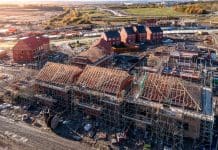Arcadis’ tender price forecast for 2022 predicts that inflationary pressures will remain throughout 2022/23, with material price increases continuing to be the main driver
Arcadis’ tender price forecast for 2022, entitled ‘Energy Sapping’, has reported that the current market cycle has reached its peak and the first signs of a slowdown are appearing.
The analysis warns that signs of strain are starting to show, despite output statistics showing construction volumes hit a historic high in May 2022 and Q2 was the busiest quarter ever recorded.
According to Arcadis, the high inflation of the first half of 2022 is likely to remain baked-in
Inflationary pressures show no signs of easing, with material price increases continuing to be the main driver. Whilst there is evidence of price stability, it is threatened by energy costs which are likely to impact the costs of material production and their availability.
The cost-of-living crisis is set to sustain upward pressure on labour costs which are likely to see catch-up pay demands in 2023 and beyond.
Construction orders begin to fall
Total construction orders have already begun to fall by 10.45% in Q2 on the previous three months, the largest quarterly fall since Q4 2020.
Further findings of the report include:
- The 2022 tender price forecast is confirmed at 10% for buildings and 12% for infrastructure, the upper end of the previous forecast’s range
- Arcadis has downgraded its overall outlook for buildings and infrastructure inflation from 2024 onwards, noting that although deflationary pressures have increased, the risk associated with energy market disruption is likely to counteract this
- For the building sector, the forecast for 2023 is unchanged at 2-3%, however, infrastructure has been increased from 4% to 5%, in recognition of high background demand and potentially greater exposure to material cost inflation
- For 2024-2025, inflation forecasts have been reduced to account for the expected greater levels of competition across all sectors, however, prices will remain high despite the weaker outlook for workload
Simon Rawlinson, head of strategic research & insight at Arcadis, said: “Whilst confidence in the construction market has remained more robust than the consumer market, it’s clear that the current cycle has peaked and we’re entering a period of slowdown.
“However, just how severe the slowdown will be, and whether it will bring down costs, remains uncertain. There are certainly signs that commodity prices are falling, but rising energy costs are baked-in, and their full impact yet to be felt.
“Therefore, we expect inflation to continue to be felt throughout the next 12 months and the effects of increased competition to eventually see inflation slow in 2024-25.














